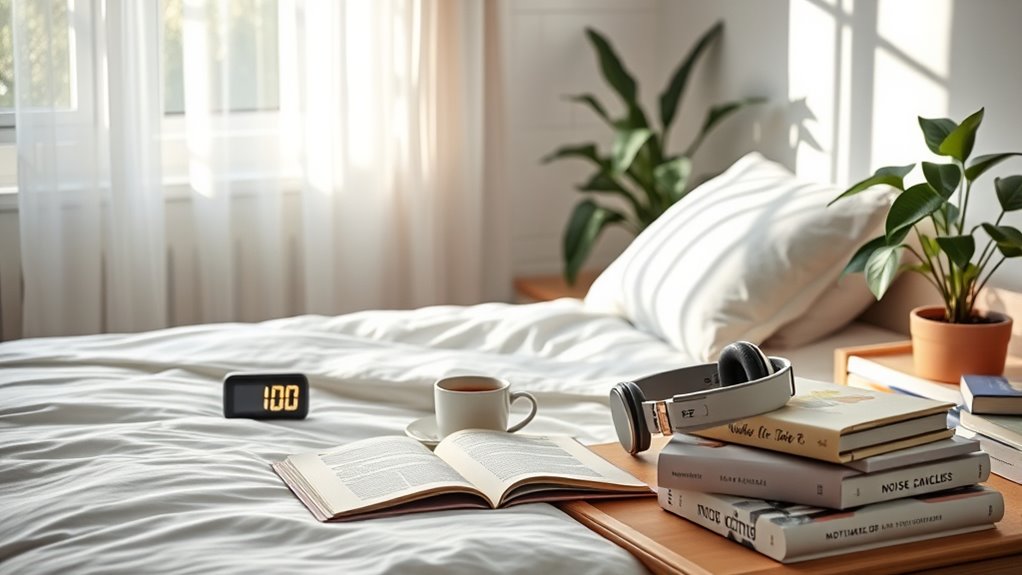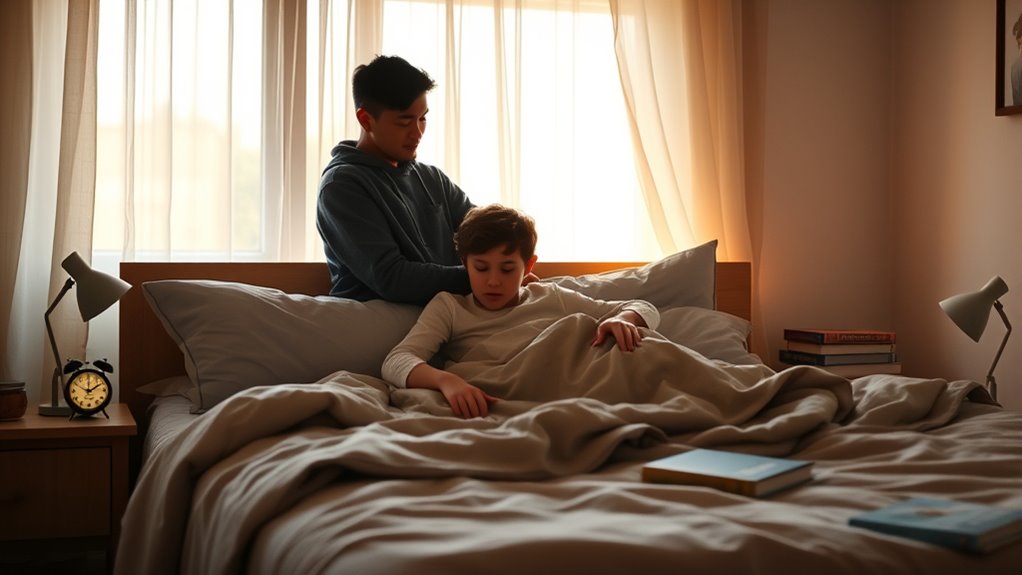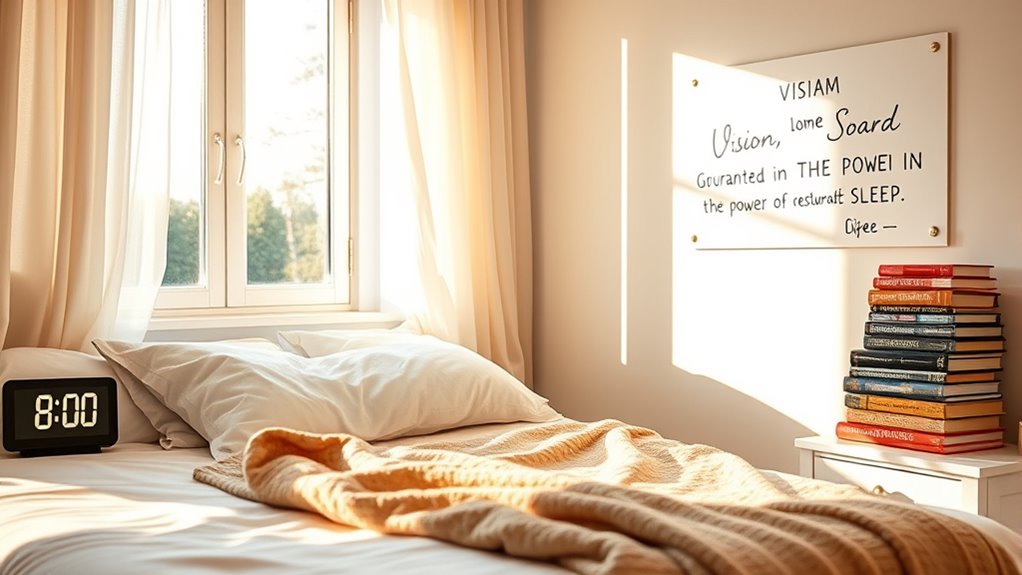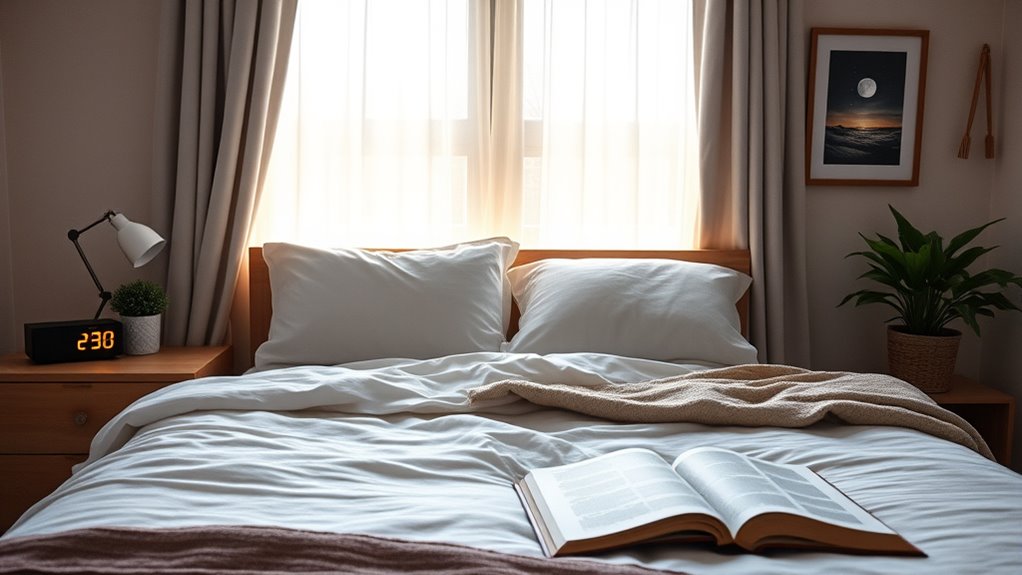Sleep is essential for your health as a teen. It influences your mood, memory, and academic performance. Quality sleep boosts your emotional resilience and immune function, making it easier to handle daily stress. However, obstacles like screen time and busy schedules can disrupt your rest. By improving your sleep hygiene, you can enhance your overall well-being. Want to discover effective strategies and tips for creating a sleep-friendly space? There’s more valuable information ahead!
Key Takeaways
- Adequate sleep enhances emotional regulation, reducing irritability and improving mood in teens.
- Quality rest boosts cognitive function, aiding memory and focus for academic success.
- Sleep deprivation increases the risk of anxiety and depression, affecting social interactions.
- Establishing consistent sleep schedules and a calming bedtime routine promotes better sleep hygiene.
- A sleep-friendly environment, free from screens and noise, significantly improves sleep quality.
The Necessity of Sleep for Teen Health

Since adequate sleep is essential for your overall well-being, understanding its importance for teen health is imperative.
Quality sleep considerably impacts your emotional state, helping regulate your mood and reduce irritability. When you’re well-rested, you’re less likely to experience depressive symptoms and more equipped to handle stress. This is particularly important as sufficient sleep helps manage anxiety, depression, and stress effectively.
Sleep also boosts your cognitive function, enhancing your memory and focus, which is crucial for academic success. Additionally, it supports your immune system and aids in muscle recovery, fundamental for physical activities.
By prioritizing sleep, you can improve your emotional resilience and make better decisions, leading to healthier lifestyle choices.
Common Obstacles to Achieving Quality Sleep

Achieving quality sleep can be challenging for teens due to a variety of common obstacles. Your internal clock shifts during adolescence, making you naturally inclined to stay up later, which conflicts with early school start times. The blue light from screens suppresses melatonin production, making it harder to fall asleep. If you’re juggling homework, extracurricular activities, and social commitments, it’s easy to push bedtime later. Additionally, stress from school and social pressures can disrupt your sleep quality. Environmental factors like noise and temperature also play a role. Insufficient sleep is linked to your physical and mental well-being, supporting immune function, hormone regulation, and recovery. To improve your sleep, try managing screen time, creating a calming bedtime routine, and prioritizing your well-being amidst your busy schedule. Your body and mind will thank you for it.
Consequences of Sleep Deprivation in Adolescents

Sleep deprivation can have serious consequences for adolescents, impacting various aspects of their lives.
You may struggle with concentration and memory recall, making it harder to learn and perform well in school. This can lead to lower academic achievement and difficulties with problem-solving. Additionally, lack of sleep can result in diminished mental performance, further hindering your ability to succeed academically.
Emotionally, lack of sleep can heighten your risk of depression and anxiety, resulting in mood swings and impaired emotional regulation.
Socially, you might find it challenging to interact with peers or maintain relationships, leading to feelings of isolation.
Physically, your immune system weakens, increasing susceptibility to illness, while sleep deprivation can also disrupt your metabolism, raising the risk of obesity.
Ultimately, these consequences can greatly affect your overall well-being and daily functioning.
Effective Strategies for Enhancing Sleep Hygiene

To enhance your sleep hygiene effectively, it’s crucial to adopt a combination of strategies that promote restful nights. Start by setting a consistent sleep schedule; go to bed and wake up at the same time every day, even on weekends. Optimize your sleep environment by keeping your bedroom dark, quiet, and cool, using curtains or earplugs as needed. Develop a calming bedtime routine with relaxing activities like reading or listening to soothing music. Limit stimulants by avoiding caffeine, especially in the evening, and turn off screens at least an hour before bedtime. Finally, incorporate lifestyle changes such as regular exercise and a balanced diet to support better sleep quality. Good sleep hygiene is essential for improving both mental and physical health, especially for teens. These strategies will help you establish healthier sleep habits.
The Role of Parents in Promoting Healthy Sleep Habits

While your teen navigates the challenges of adolescence, their sleep habits can greatly impact their overall well-being. As a parent, your involvement is essential.
Set a firm bedtime and stick to it, as teens with established routines sleep better and feel less drowsy during the day. Help them maintain consistent sleep schedules, even on weekends, to support their natural sleep-wake cycle.
Create a sleep-friendly environment by keeping bedrooms cool, dark, and quiet, and limit screen time before bed. Discuss the importance of sleep and engage them in setting their own sleep routines.
Long-Term Advantages of Good Sleep Hygiene

Establishing good sleep hygiene can greatly enhance your teen’s long-term well-being, impacting various aspects of their life.
With better sleep, your teen will enjoy improved academic performance through better memory retention and focus, leading to greater creativity and problem-solving skills.
Physically, adequate rest supports growth, boosts the immune system, and aids in muscle recovery, essential for active teens.
Emotionally, quality sleep reduces stress and anxiety, promotes mood regulation, and helps maintain healthy relationships.
These advantages extend to long-term success, as well-rested individuals tend to be more productive and motivated.
Prioritizing sleep builds resilience against life’s challenges, ensuring your teen is prepared for whatever comes their way.
Good sleep hygiene truly sets the foundation for a brighter future.
Practical Tips for Creating a Sleep-Friendly Environment

Creating a sleep-friendly environment is crucial for helping your teen achieve the quality rest they need. Start by establishing a consistent sleep routine; going to bed and waking up at the same time every day, even on weekends, helps regulate their internal clock.
Optimize the bedroom by keeping it cool, dark, and quiet—consider blackout blinds and comfortable bedding. Minimize electronic distractions by keeping devices out of the room and encouraging device-free zones.
Establish a calming pre-bed routine with relaxing activities like reading or meditation. Finally, avoid stimulants like caffeine and overscheduling to guarantee your teen has ample time for restful sleep.
These practical tips will promote better sleep hygiene and overall well-being.
Frequently Asked Questions
What Are Some Signs of Sleep Disorders in Teens?
You might notice several signs of sleep disorders in teens. Excessive daytime sleepiness and chronic fatigue can point to underlying issues.
Look for mood swings, anxiety, or difficulty concentrating, as these can indicate psychological impacts. Social withdrawal and irritability might also arise, affecting relationships.
Additionally, physical symptoms like headaches or a weakened immune system could be present. If you see these signs, it’s essential to address them for overall well-being.
How Does Sleep Affect Physical Performance in Sports?
Sleep directly impacts your physical performance in sports.
When you get enough rest, your muscles repair effectively, enhancing recovery after workouts. Good sleep boosts your endurance, keeping your energy levels high during competitions.
It sharpens your reaction time and decision-making, essential for making quick plays. Plus, quality sleep reduces your injury risk and helps manage stress, allowing you to focus better.
Prioritizing sleep can truly elevate your game and overall athletic performance.
Can Naps Improve Sleep Hygiene for Teens?
Imagine your phone running on low battery, struggling to keep up. Just like that, you need a recharge.
Naps can indeed improve your sleep hygiene, boosting alertness and cognitive function. Studies show that a quick 20-minute nap can enhance memory and focus, making you more effective in school.
However, timing’s key; if you nap too long or late, it might disrupt your nighttime sleep. So, keep your naps short and sweet!
What Role Does Diet Play in Sleep Quality?
Your diet plays a vital role in your sleep quality. Eating a balanced mix of fruits, vegetables, and whole foods can enhance your sleep.
Foods like kiwifruit and fatty fish are particularly beneficial. Avoid heavy meals close to bedtime, and keep an eye on sugar and caffeine intake, as they can disrupt your rest.
Staying hydrated throughout the day also helps. Overall, a nutritious diet supports better sleep patterns and overall well-being.
How Can Stress Management Techniques Aid Sleep?
Stress management techniques can greatly soothe your sleep struggles. By practicing progressive muscle relaxation and deep breathing, you’ll calm your chaotic thoughts and create a peaceful mindset.
Mindfulness meditation helps you observe without judgment, easing anxiety. Picture a serene scene with guided imagery, allowing stress to dissipate.
Consistently incorporating these calming practices into your routine can dramatically enhance your sleep quality, making nightly rest feel more restorative and rejuvenating.
Conclusion
Incorporating good sleep hygiene into your routine can transform your health and well-being. Imagine a teen named Alex, who once struggled to stay awake in class due to late-night gaming. After prioritizing sleep, Alex found focus and energy, leading to better grades and a happier mood. By making simple changes, like setting a bedtime and limiting screen time, you too can access the benefits of restful nights. Start today, and watch how quality sleep can change your life!









